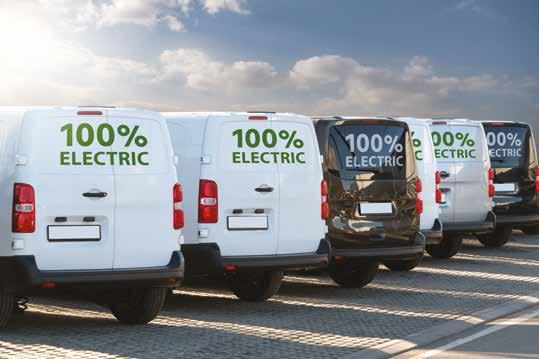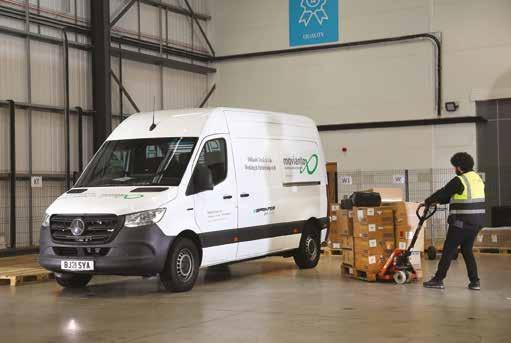
3 minute read
Plug-in Van Grant extended BP develops e-mobility solution Movianto opts for EV trial

Plug-in Van Grant extended
The government has extended access to the Plugin Van Grant for an additional two years, until 2024/25. The move is expected to support the purchase of thousands of EV vans and trucks, as existing grants have already helped with the purchase of more than 26,000 electric vans and trucks in the UK since the scheme was launched in 2021.
“As demand for electric vehicles continues to grow at speed, this extension to our grant scheme will allow tens of thousands more vans to be purchased, transporting goods in a way which is kinder to our environment,” said transport minister Trudy Harrison.
The move has been welcomed by the transport industry. Denise Beedell, public policy manager at Logistics UK said: “Given the current pressures on public finances, Logistics UK is pleased to see the government has heeded our calls to provide support to help the van sector to meet net zero targets. The level of funding within this announcement demonstrates a clear recognition of the importance of this essential sector.”
“Extending the Plug-in Van Grant is welcome as it will encourage more operators to make the switch to electric vehicles over the next three years,” said Mike Hawes, chief executive of the SMMT.
“While the van market saw record electric uptake last year, it remains some distance behind cars, with battery electric vans making up just 3.6% of registrations. The speed of uptake must be increased, which requires incentives and significant investment in EV charge points, especially those that meet the specific needs of commercial vehicles.”
• The government has also decided to continue the Category B licence derogation for alternatively fuelled vehicles, that allows vans with a gross weight of up to 4.25-tonnes to be driven on a car licence, in recognition of the additional weight of the batteries.
Charger strategy
The government has launched a £1.6bn Electric Vehicle Infrastructure Strategy, that calls for a tenfold increase in the number of public charging points, to around 300,000, by 2030. The strategy will also introduce legislation to make charging points more reliable, accessible and user-friendly.
“For too long many charge point operators have tried to force customers to use only their networks, by making them pay a membership fee or download an app to charge,” said Phil Shadbolt, tech entrepreneur behind electric vehicle charging brand EZ-Charge.
“Forcing operators to do away with these kinds of outdated practices and make the UK’s charging network work for everybody will be a big step forward.”
BP charge card
Fuel supplier BP has launched an SME Fuel and Charge card, for fleets of 1-10 vehicles, to help smaller companies make a switch to electric vans. The card provides access to more than 8,500 bp pulse public charging points and more than 3,400 fuel stations. It offers a simple solution for both electric charging and fuel purchases, with access to BP’s 24/7 online portal, to easily control fuel card use.
Movianto opts for EV trial
Healthcare logistics specialist Movianto is trialling its first electric eSprinter, supplied by dealer Midlands Truck & Van. The company has 120 temperature-controlled vans and 100 uninsulated light commercials, all of which are Mercedes-Benz Sprinter models. Now though, it is looking to delivery vaccines and medical supplies with the battery-powered model.
“We take great care to consider the effect of our business on the environment and are always looking at ways to minimise its impact,” said head of fleet Mervyn McIntyre.
“This trial is helping us to understand how electric distribution vehicles can fit into our fleet, what attributes they offer and any operational issues they might present. The eSprinter offers all the proven benefits of a MercedesBenz van but with zero exhaust emissions. As with any battery-powered vehicle there’s a limit to its range, but the electric driveline also brings advantages in other areas. The van is very smooth, easy to drive in traffic and its near-silent driveline is much less likely to disturb customers or their neighbours when making deliveries.”








